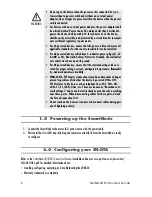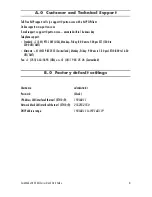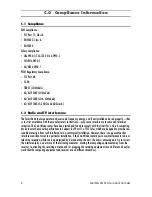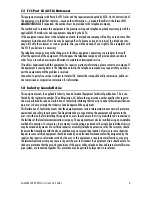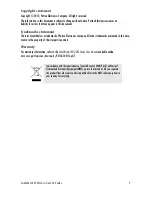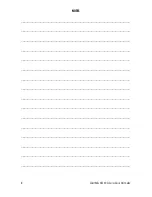
2
SmartNode 4830 DSL Series Quick Start Guide
1.0 Powering up the SmartNode
1.
Connect the SmartNode to the mains (AC) power source with the power cable.
2.
Wait until the
Power
LED stops blinking and remains constantly lit. Now the SmartNode is ready
to configure.
2.0 Configuring your SN-DTA
Refer to the
SmartNode 4830 DSL Series User Manual
available online at
www.patton.com/manuals/
SN4830DSL.pdf
for detailed information about:
•
Installing, configuring, operating, and troubleshooting the SN4830
•
Warranty, trademark & compliance
• Do not open the device when the power cord is connected. For sys-
tems without a power switch and without an external power
adapter, line voltages are present within the device when the power
cord is connected.
• For devices with an external power adapter, the power adapter shall
be a listed
Limited Power Source
The mains outlet that is utilized to
power the device shall be within 10 feet (3 meters) of the device,
shall be easily accessible, and protected by a circuit breaker in compli-
ance with local regulatory requirements.
• For AC powered devices, ensure that the power cable used meets all
applicable standards for the country in which it is to be installed.
• For AC powered devices which have 3 conductor power plugs (L1, L2
& GND or Hot, Neutral & Safety/Protective Ground), the wall outlet
(or socket) must have an earth ground.
• For DC powered devices, ensure that the interconnecting cables are
rated for proper voltage, current, anticipated temperature, flammabil-
ity, and mechanical serviceability.
• WAN, LAN & PSTN ports (connections) may have hazardous voltages
present regardless of whether the device is powered ON or OFF.
PSTN relates to interfaces such as telephone lines, FXS, FXO, DSL,
xDSL, T1, E1, ISDN, Voice, etc. These are known as “hazardous net-
work voltages” and to avoid electric shock use caution when working
near these ports. When disconnecting cables for these ports, detach
the far end connection first.
• Do not work on the device or connect or disconnect cables during peri-
ods of lightning activity.
WARNING


